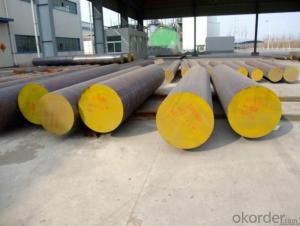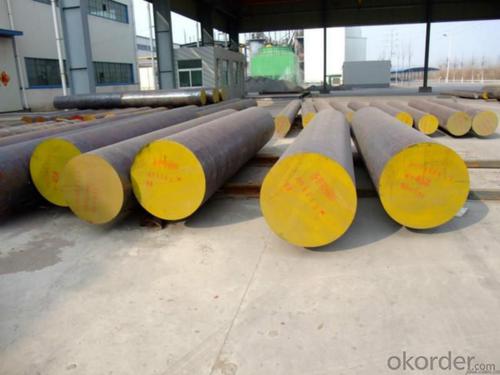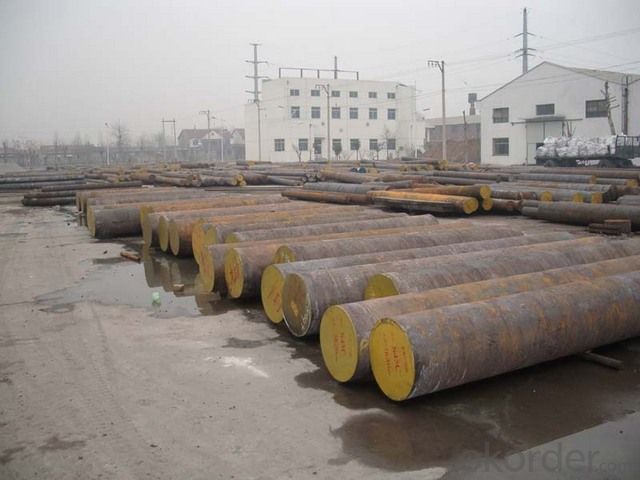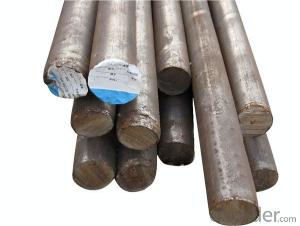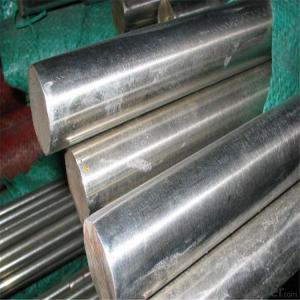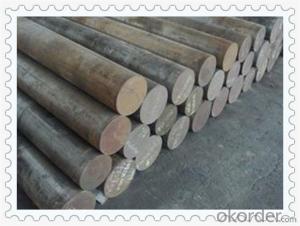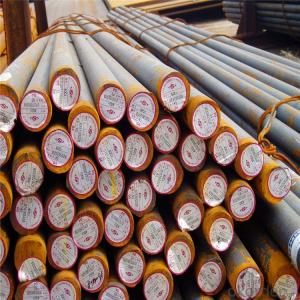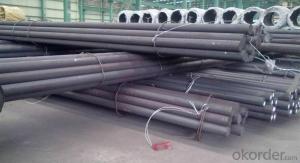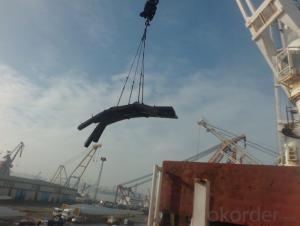AISI 1055 Round Bar Hot Rolled Carbon Steel
- Loading Port:
- Tianjin
- Payment Terms:
- TT OR LC
- Min Order Qty:
- 25 m.t.
- Supply Capability:
- 50000 m.t./month
OKorder Service Pledge
OKorder Financial Service
You Might Also Like
Specification
AISI 1055 Round Bar Hot Rolled Carbon Steel
Product Description:
1. Hot rolled steel round bar
2.Quality:L.F+V.D etc
3.Grade:C55 S55C CK55 1055
4.Hardness:229HB
5.Tensile strength:600MPA
6.Yield strength: 355MPA
7.elogation:16% Reduction of area:40%
Chemical Composition:
China | America | Germany | Japan | C | Si | Mn | Cr | P/S |
55B | AISI1055B | C55B | S55CB | 0.52-0.60 | 0.17-0.37 | 0.5-0.9 | ≤0.25 | ≤0.35 |
Sizes details:
Sizes details | diameter | 16-320mm |
length | 3-12m(canbe customerized) | |
Sizes tolerance | length | +/-100mm(max) |
diameter | +/-2mm(max) | |
Straightness | 3mm/m(max) |
Application:
Carbon steel rod applies to chemical industry, shipping industry,manufacturing industry, construction, decorate industry, electric power, pump shafts, sanitary wares, furniture handles, boiler, high temperature resistant,low temperature resistant,corrosion resistant
Our service:
We can supply steel round bar, square steel, the grade such as,SS400B, S20C, S45C, Ck45, SAE1020B, SAE1045B, SAE4140,SAE4150, SAE4340, SAE8620, 42CrMo4, 15B36Cr, S50C, S55C,S65C.20Cr,40Cr GCr15. The diameter is from 16mm to 320mm. It is hot rolled and Black surface. If you need, please feel free to contact me.
Products Show:
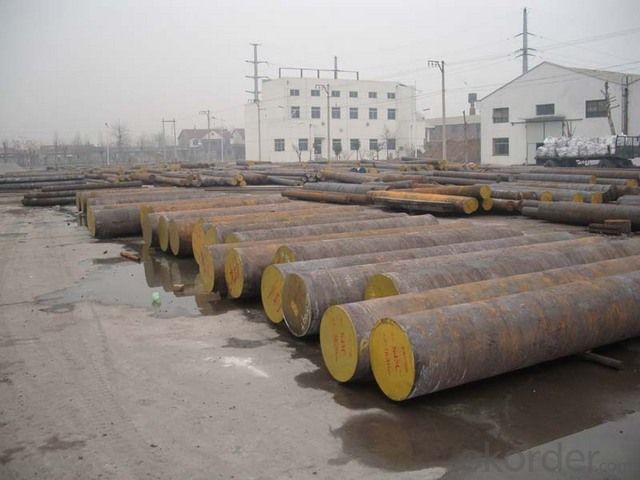
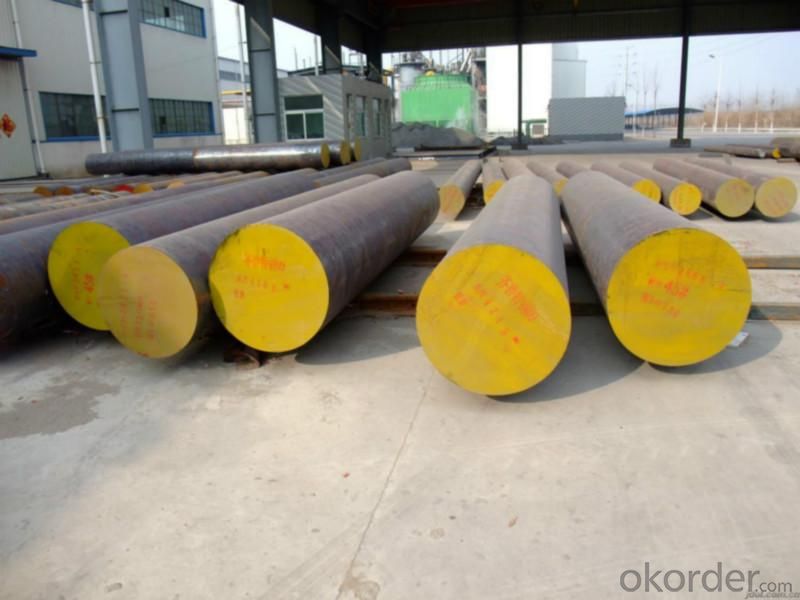
- Q: What are the different welding techniques used for special steel?
- There are several welding techniques used for special steel, including gas metal arc welding (GMAW), shielded metal arc welding (SMAW), flux-cored arc welding (FCAW), and tungsten inert gas welding (TIG). These techniques are chosen based on factors such as the type of special steel, its thickness, and the desired weld characteristics. Each technique has its own advantages and limitations, and the selection depends on the specific requirements of the welding application.
- Q: Can special steel be used in the telecommunications equipment manufacturing industry?
- Yes, special steel can be used in the telecommunications equipment manufacturing industry. Special steel is known for its high strength, durability, and corrosion resistance, which are important factors for the telecommunications industry. It can be used in the manufacturing of various components such as antennas, transmitters, receivers, and cables, ensuring reliable and efficient communication networks.
- Q: How does special steel contribute to the mining industry?
- Special steel plays a crucial role in the mining industry by providing the necessary strength, durability, and resistance to extreme conditions required for various mining equipment and machinery. It is used in the manufacturing of drill bits, excavator buckets, conveyor systems, crushers, and other mining tools. Special steel's exceptional properties allow for increased efficiency, reduced downtime, and improved safety in mining operations, ultimately contributing to enhanced productivity and profitability in the industry.
- Q: What are the common challenges in casting special steel?
- Some common challenges in casting special steel include achieving uniformity in composition and microstructure, controlling the cooling rate to prevent cracking and distortion, minimizing the presence of impurities and inclusions, and ensuring proper solidification and shrinkage control. Additionally, the high melting points and reactivity of special steel alloys can pose challenges in terms of handling and maintaining the desired chemistry throughout the casting process.
- Q: What are the main characteristics of creep-resistant steel?
- Creep-resistant steel, characterized by its high resistance to deformation caused by prolonged exposure to high temperatures and stress, possesses several key features: 1. It can withstand extremely high temperatures without significant deformation, making it ideal for applications in power plants, boilers, and gas turbines, where materials are exposed to elevated temperatures for extended periods. 2. It exhibits excellent mechanical properties, including high tensile strength and toughness, enabling it to endure stress and pressure, even at high temperatures. 3. It is highly resistant to corrosion and oxidation, owing to its alloying with elements like chromium, molybdenum, and nickel. This makes it suitable for use in environments with moisture, chemicals, and gases. 4. It maintains its shape and size under prolonged exposure to high temperatures and stress, ensuring dimensional stability and preserving the integrity of structures or components. 5. Its combination of high temperature resistance, strength, and corrosion resistance contributes to its durability and longevity, reducing the need for frequent maintenance and replacement. This improves the overall efficiency and cost-effectiveness of applications relying on creep-resistant steel. In conclusion, creep-resistant steel is specifically designed to endure the challenging conditions of high temperatures and stress, making it the preferred choice in industries prioritizing reliability and safety.
- Q: What are the limitations of special steel?
- Some limitations of special steel include its high cost and limited availability, as well as the difficulty in shaping and processing it. Additionally, special steel may have lower tensile strength compared to other materials and can be prone to corrosion if not properly maintained.
- Q: Can special steel be used in the production of consumer goods?
- Consumer goods can make use of special steel in their production. This type of steel is made up of alloys that have been specifically designed to possess distinct characteristics, such as exceptional strength, resistance to corrosion, or heat endurance. These traits enable special steel to be well-suited for a wide array of consumer goods that require longevity, robustness, or protection against wear and tear. One example of the utilization of special steel is in the manufacturing of kitchen appliances, like knives and cookware, where durability and resistance to corrosion are crucial. Additionally, consumer electronics, such as smartphones and laptops, can incorporate this steel in their casing or internal components to ensure structural integrity and safeguarding. Moreover, the automotive industry frequently relies on special steel for the creation of various consumer goods, including bicycles, motorcycles, and cars. The steel's combination of high strength and lightness makes it an ideal choice for constructing sturdy and enduring vehicle frames, engine parts, and other components. To summarize, the application of special steel in the production of consumer goods is indeed feasible due to its unique properties, which make it suitable for situations necessitating strength, durability, and protection against corrosion or wear.
- Q: What are the main advantages of using special steel in the automotive racing industry?
- The main advantages of using special steel in the automotive racing industry are its high strength-to-weight ratio, exceptional durability, and excellent thermal conductivity. Special steel allows for the construction of lighter and stronger components, enhancing the overall performance and speed of racing vehicles. It also ensures greater safety for drivers by providing increased resistance to impact and fatigue. Furthermore, the superior thermal conductivity of special steel aids in dissipating heat generated during intense racing conditions, preventing overheating and maintaining optimal engine performance.
- Q: What are the different non-metallic inclusions in special steel?
- There are several types of non-metallic inclusions that can be found in special steel. These inclusions are usually formed during the steelmaking process and can have a significant impact on the properties and performance of the steel. One common type of non-metallic inclusion is oxide inclusions. These inclusions are typically formed by the reaction of oxygen with elements present in the steel, such as silicon, manganese, and aluminum. Oxide inclusions can have a detrimental effect on the steel's mechanical properties, such as reducing its toughness and ductility. Another type of non-metallic inclusion is sulfide inclusions. These inclusions are formed by the reaction of sulfur with elements like manganese and iron. Sulfide inclusions can also have a negative impact on the steel's mechanical properties, as they can act as stress concentration sites and promote the initiation of cracks. Nitride inclusions are another type of non-metallic inclusion that can be found in special steel. These inclusions are formed by the reaction of nitrogen with elements like aluminum and titanium. Nitride inclusions can have a positive effect on the steel's properties, as they can improve its strength and hardness. Other types of non-metallic inclusions that can be present in special steel include carbide inclusions, which are formed by the reaction of carbon with elements like iron and chromium, and silicate inclusions, which are formed by the reaction of silica with elements like calcium and aluminum. Overall, the presence and characteristics of non-metallic inclusions in special steel can greatly influence its performance and suitability for specific applications. Therefore, it is important for steel manufacturers to carefully control and minimize the formation of these inclusions in order to produce high-quality steel with desired properties.
- Q: How are copper alloys used in electrical applications?
- Copper alloys are widely used in electrical applications due to their excellent conductivity and corrosion resistance. They are used to manufacture electrical wires, connectors, and busbars, ensuring efficient transmission of electricity. Additionally, copper alloys are utilized for electrical contacts and switches, as they provide good wear resistance and high electrical and thermal conductivity.
Send your message to us
AISI 1055 Round Bar Hot Rolled Carbon Steel
- Loading Port:
- Tianjin
- Payment Terms:
- TT OR LC
- Min Order Qty:
- 25 m.t.
- Supply Capability:
- 50000 m.t./month
OKorder Service Pledge
OKorder Financial Service
Similar products
Hot products
Hot Searches
Related keywords
